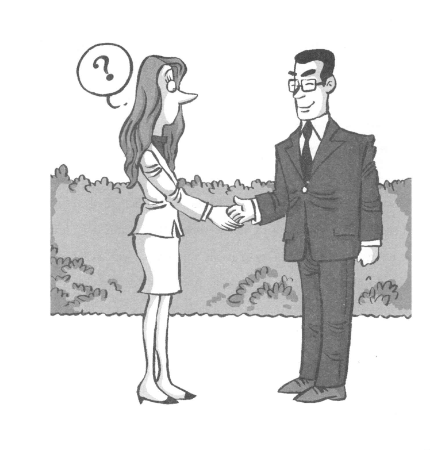For a long time, Bryan wasn't sure whether one of his joint venture partners liked him because he never returned Bryan's firm handshakes with any vigor or conviction. The exchange was always brief as if he didn't really care to shake Bryan's hand. Over the past few years, the two of them have enjoyed many dinners, drinks and meetings together. All other indications show Bryan that they have a good relationship with each other, so Bryan has simply ignored his weak handshake as a cultural difference.
Indeed, after a few conversations with several Chinese friends, both men and women, I realized that there is a big cultural difference regarding handshakes.
In the West, a firm handshake is a sign of confidence and sincerity. Aware of this, most men and women in Europe and America shake hands with a solid grasp and a strong squeeze.
In China, the handshake culture is quite different. Although many Western-educated Chinese or Chinese business men and women who frequently work with foreigners also have firm handshakes, most others do not. Bryan and I have often found that many Chinese have a very soft or weak handshake. For most Chinese, a handshake is not a way to show one's confidence or sincerity. Instead, it is just a formality that people have to go through, sometimes even with reservations.
I think that deep down, many Chinese are uncomfortable having intentional physical contact with strangers (I add intentional here because people are not bothered by bumping into each other on crowded streets). Even among the Chinese, handshakes between strangers are perfunctory. This discomfort is compounded when the handshake is between a Chinese and a foreigner. A decade or a two earlier, most Chinese had not even seen any foreigners on the streets, much less shaken hands with them. Now, even though there are many laowais (a Chinese nickname for foreigners which literally means good-old-foreigner) living in China, having direct physical contact with one is still the exception rather than the norm. Therefore, most Chinese are a bit shy when they have to shake a laowai's hand.

Among friends, the Chinese do not usually use a handshake as a way of greeting. Between men they typically pat each other on the shoulder to say "hello" and express familiarity. Between women, they usually hold each other hands or touch each other's forearms to indicate close friendship. The only time one witnesses a vigorous handshake between two Chinese is when two really good friends, typically men, have not seen each other for a long time. The enthusiastic handshake is a way of saying, "Long time no see! I've really missed you!" Between two long separated girlfriends, the Chinese prefer to hug each other instead.
A handshake between a male and a female is especially tricky. I find that when I shake hands with another Chinese woman, the grasp is often firm and without reservation. But when I try to extend a firm shake with a Chinese man, the reaction I meet is typically the opposite from what I would expect with a Western man. With a Western man, my firm shake would be met with an equally if not harder squeeze back. But in China, the harder I try to squeeze, the weaker the reaction. It is as if they are put off by my firmness.
It turns out that it isn't just with me that Chinese men do not shake hands firmly; they don't do it with any woman, especially not with any young Chinese ladies. Almost every Chinese man I interviewed told me that they do not want to squeeze a woman's hand hard because they don't want to appear rude. Shaking a woman's hand firmly may be mistaken for being too eager. Holding her hand too tightly might be seen as harassment. In order to avoid these potential misunderstandings, the Chinese men choose to err on the safe side. A weak handshake is much better than being accused of forwardness or impropriety.
Likewise an unmarried Chinese girl is likely to have a very soft handshake with a man because she does not want to appear too forward. Prior to the 20th century, Chinese women did not have any physical contact with men other than those in their immediate family. She was not even allowed to see or touch her betrothed until their wedding night. Although this is no longer the case today, many unmarried Chinese women still keep a physical distance from men outside of their family. When they have to shake hands, they do it ever so lightly to maintain their "untouchable purity." Shaking hands firmly would be too aggressive and too unladylike.
So when you shake hands with a Chinese person, don't presume they lack confidence or sincerity just because they don't have a firm handshake. Just remember that the handshake culture in China is quite different from that in the West.
(selected from 101 Stories for Foreigners to Understand Chinese People by Yi S. Ellis and Bryan D. Ellis, published by China Intercontinental Press in 2012)